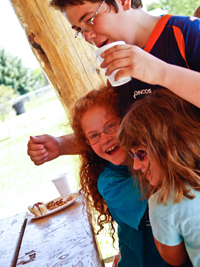Editor's note: This is the latest in a series of stories about congregations responding to the Presbyterian Church (U.S.A.)'s call to "Grow Christ's Church Deep and Wide." The call to grow in evangelism, discipleship, servanthood and diversity was adopted by the 2008 General Assembly and renewed by the 2010 General Assembly. — Jerry L. Van Marter
Sometimes, when circumstances make it necessary to think about a different way to do things, what is found is a better way of doing things.
Manhattan Presbyterian Church in Manhattan, Mont., needed to approach Vacation Bible School (VBS) in a different way in order to best maximize space and volunteer availability. What they came up with proved to be a winning answer all around.
"They did VBS this year in a completely different way than they have ever done it," says the Rev. Kathy Goodrich, executive presbyter of Yellowstone Presbytery of which Manhattan Presbyterian Church is a member. "They looked at not being able to do it in the standard way they had always done it with as many people and they did it in an entirely new way and ended up reaching over 50 kids."
"The church does not have more than 50-70 people in worship on a Sunday," she adds.
The usual model for VBS is a week-long series of classes and activities with children in age groups ranging from Pre-K to rising sixth or seventh graders. That requires space to house all of the classes and activities as well as volunteers to help out with teaching all those lessons and running all the crafts and other fun things that are part of the package.
When the Rev. Debbie Funke and others from the church started to organize VBS 2010, they decided to try a little something different.
"We took our oldest class, the rising 5th, 6th, and 7th graders, and took that out of the picture for the regular week of Vacation Bible School and scheduled them for the week before," explains Funke. "We called it a VBS training camp."
During the week, middle school students had full immersion in the content of the lessons on their age level as well as doing things like painting murals and doing craft samples and prepping craft materials.

The Rev. Debbie Funke and some of the junior counselors lead singing.
"They learned all of the games and songs and activities and we were really discipling them and training them on what it means to be a leader so we talked a lot about what leaders would do at various points and how they would interact in their classes," she says.
Funke says they also tailored the experience a bit more to the age of the middle schoolers, starting a little later in acknowledgement that the older kids enjoy sleeping later in the summer. Each day included lunch, and one afternoon was spent at the river on a cookout and some swim time.
"Often times that oldest class is a little bit restless anyway and have kind of outgrown VBS so this gave them their own unique experience," says Funke. "It made it a little bit like camp as well."
There was more to the VBS training camp idea than simply giving the older children a better experience. They were given leadership training because they were being prepared to return the following week to help lead VBS for the rest of the children.
"They were called junior counselors," says Funke. "Some of them came and helped their teachers in prep and set up the rooms for the classes. It multiplied our helpers."
"We still had to have adult lead teachers and adults leading the process, but these students were often connected to two or three small groups of younger students and they were able to maximize the impact the adult teachers had with the younger students because they had help with the class and activities and games."
Some junior counselors were paired with a table group of two or three students with whom they would work closely which also gave the younger students a better experience.

A junior counselor helps a kindergartener with a craft project.
"They were good with the little guys," Funke notes. "I wasn’t sure how that would work out, I thought we were going to have too many workers for the kids and then they’d get bored but they worked well in tiny groups. They were the older buddy and that did work."
There were 54 younger children and ten junior counselors. Having the junior counselors helped the teachers and Funke, who directed the training camp and then was able teach a younger class the following week.
In addition, it helped provide more classroom space for both groups during their weeks, and it also allowed a few adult volunteers to come help with the training camp who were unavailable the following week during regular VBS, allowing for more adult volunteers to participate overall than would have been possible otherwise.
"The older students also got the double whammy of really having the lessons again as they went through it the second week so it became a very effective way of doing it," says Funke. "It was the willingness to have some adults that would help one week and some another week taking that elder class."
"It was a lot of fun and those students, I think, had a quality experience. We felt it was very worthwhile," Funke says. "I think we would do it again."
Toni Montgomery is a free-lance writer in Statesville, N.C., where she also serves as church secretary for First Presbyterian Church of Statesville.

